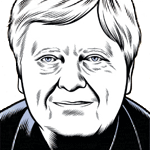A half century ago, William H. Gass completed his doctoral dissertation in philosophy. Its title, “A Philosophical Investigation of Metaphor,” seems prophetic, announcing the two constants that would fill the many books he’d eventually write: intellectual might, and a consuming relationship with language and imagery. The combination produced writing that could win readers over via its energy and sparkle, then move them via its substance. Rarely had prose that so shimmered and soared been, at heart, so heavy with ideas. (In a 1978 public debate about fiction, John Gardner said, of his writing versus Gass’s: “The difference is that my 707 will fly and his is too encrusted with gold to get off the ground.” Gass replied, “There is always that danger. But what I really want is to have it sit there solid as a rock and have everybody think it is flying.”)
Gass’s works of fiction include Omensetter’s Luck (1966), Willie Masters’ Lonesome Wife (1968), In the Heart of the Heart of the Country (1968), and the long and challenging novel The Tunnel (1995), on which he labored for nearly thirty years. Narrated by a despicable university historian named William Kohler, whose bitterness is often seductively lyrical, The Tunnel was met with both high praise and thorough disdain. Dalkey Archive Press, which has published the novel since the late 1990s, will soon release an unabridged audio reading by the author, recorded during the past year.
You have reached your article limit
Sign up for a digital subscription and continue reading all new issues, plus our entire archives, for just $1.50/month.
Already a subscriber? Sign in





